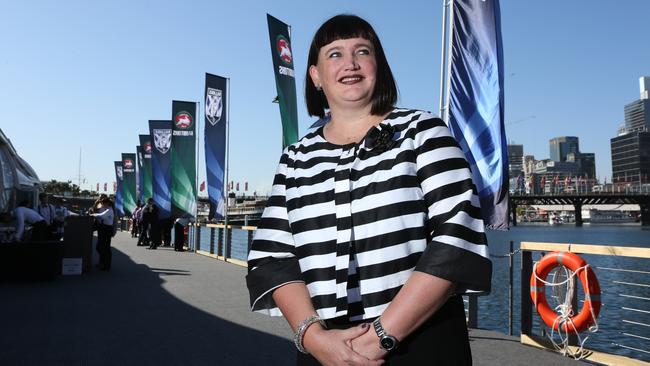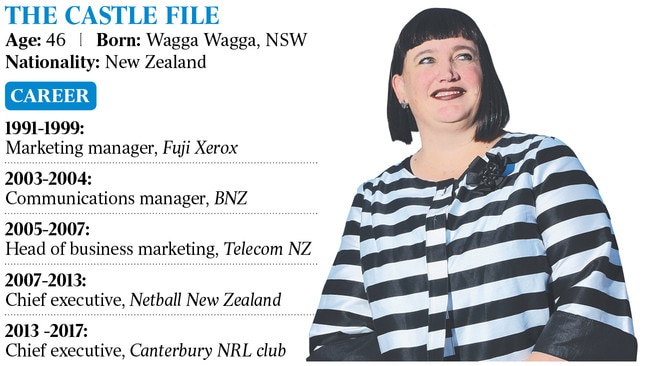Rugby Australia hand over keys to the Castle
Rugby Australia is set to make Raelene Castle the first woman to run a major football code in this country.

Rugby Australia is understood to have broken new ground by offering its chief executive position to Raelene Castle, who is set to become the first female to run a major football code in this country.
And in other rugby news, Rugby Australia deputy chairman Brett Robinson is heading into negotiations today with Andrew Forrest’s Indo Pacific Rugby Championship confident the two parties can reach a settlement that will allow the IPRC to coexist with Super Rugby from 2019.
Officially Rugby Australia still has not found a replacement for its CEO, Bill Pulver, who will remain in the position until his successor is able to start but The Australian understands that Castle, who was always one of the favourites for the position, has been offered the job, with an announcement expected today.
She is believed to have beaten a high-quality field, including former Australia captain and Fox Sports rugby commentator Phil Kearns, and curiously enough she is regarded as being a “safe” appointment. As the CEO of the Canterbury-Bulldogs for four years and before that as chief executive for Netball New Zealand for six years, Castle has considerable experience as a sports administrator running a code.

For all Pulver’s abilities and experience, the fact that he had never run a sport before joining the then Australian Rugby Union was always regarded as a liability.
Tennis Australia has a female president and chair in Jayne Hrdlicka and Kate Palmer was Netball Australia CEO, but no woman has been CEO of a major Australian football code.
It might not be her gender that Australian rugby fans have most difficulty with but her nationality.
The thought of a New Zealander, albeit one born in Wagga Wagga, running Australian rugby would have seemed preposterous less than a decade ago, but much of that barrier was broken down when Robbie Deans was appointed Wallabies coach in 2008.
Besides, as Australian rugby now mimics NZ rugby’s centralised model, who better to take charge than a Kiwi?
Pulver will depart carrying much of the credit/blame for reducing Australia’s Super Rugby footprint from five teams to four. While it may take years to repair the relationship with RugbyWA, there are indications RA is prepared to work with Forrest.
The IPRC had expressed concern that RA was reluctant to give a long-term commitment to the competition but Robinson yesterday indicated RA was looking at whether Forrest’s competition might be worked into the post-2020 landscape.
“The issue around the term (of the agreement) we’re certainly open to discuss but really what we’re seeking to achieve is a trigger for a conversation around alignment going into the next broadcast deal,” Robinson said.
What that means is Australia is looking to a time when South Africa might decide its future lies in Europe, at which point RA would be looking at how Super Rugby evolves. The proposal is that New Zealand and Australia each would field five teams, which presumably would mean the Western Force would be revived, and that the trans-Tasman partners would join Forrest’s five Asia teams to form a 15-team time-zone friendly competition.
By the time of the next broadcast deal, the IPRC would have been running for two seasons. It makes sense that the IPRC is going head to head with Super Rugby in the February-July timeslot rather than taking on the National Rugby Championship.
If RA combines with the IPRC, the two competitions could gel in terms of playing schedules.
It’s unlikely that RA will agree to Forrest’s request that it make all Australians playing in the IPRC — those spread throughout Asia and the Pacific — eligible for the Wallabies. And even in the case of those Australians who join the Perth club in the IPRC, Wallabies eligibility will be judged on a case-by-case basis.
That means that a Scott Fardy, for instance, could be considered for the Wallabies but any player who tries to negotiate a better contract by playing off Super Rugby against the IPRC might find the selection door shut.
Then there is the issue of access to club players. NSW are understood to have slammed the door on IPRC interest in the Shute Shield, while Melbourne have not formulated an opinion either way. Queensland and the ACT are looking to see what sister-city relationships can be built with Forrest’s Asian clubs that would give their players access to a higher standard of football. For that to work, the IPRC needed to be staged from August onwards.
Robinson says all the states will have the opportunity to negotiate with the IPRC themselves. There will be no centrally monitored RA policy on player access.
“This process has been a good one. We’re into the detail of working through what the issues are, we have a term sheet that we are looking to discuss tomorrow and we don’t believe there is anything in that that we shouldn’t be able to resolve,” Robinson said.



To join the conversation, please log in. Don't have an account? Register
Join the conversation, you are commenting as Logout